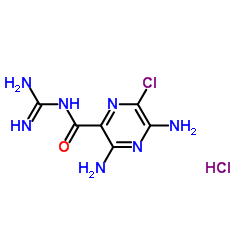Amiloride-15N3 hydrochloride
Modify Date: 2024-04-01 08:30:14

Amiloride-15N3 hydrochloride structure
|
Common Name | Amiloride-15N3 hydrochloride | ||
|---|---|---|---|---|
| CAS Number | 1216796-18-7 | Molecular Weight | 269.068 | |
| Density | N/A | Boiling Point | N/A | |
| Molecular Formula | C6H9Cl2N415N3O | Melting Point | N/A | |
| MSDS | N/A | Flash Point | N/A | |
Use of Amiloride-15N3 hydrochlorideAmiloride-15N3 (hydrochloride) is the 15N labeled Amiloride hydrochloride[1]. Amiloride hydrochloride (MK-870 hydrochloride) is an inhibitor of both epithelial sodium channel (ENaC[2]) and urokinase-type plasminogen activator receptor (uTPA[3]). Amiloride hydrochloride is a blocker of polycystin-2 (PC2;TRPP2[4]) channel. |
| Name | 3,5-Diamino-N-(15N2)carbamimidoyl-6-chloro-2-pyrazine(15N)carboxamide hydrochloride (1:1) |
|---|---|
| Synonym | More Synonyms |
| Description | Amiloride-15N3 (hydrochloride) is the 15N labeled Amiloride hydrochloride[1]. Amiloride hydrochloride (MK-870 hydrochloride) is an inhibitor of both epithelial sodium channel (ENaC[2]) and urokinase-type plasminogen activator receptor (uTPA[3]). Amiloride hydrochloride is a blocker of polycystin-2 (PC2;TRPP2[4]) channel. |
|---|---|
| Related Catalog | |
| In Vitro | Stable heavy isotopes of hydrogen, carbon, and other elements have been incorporated into drug molecules, largely as tracers for quantitation during the drug development process. Deuteration has gained attention because of its potential to affect the pharmacokinetic and metabolic profiles of drugs[1]. |
| References |
| Molecular Formula | C6H9Cl2N415N3O |
|---|---|
| Molecular Weight | 269.068 |
| Exact Mass | 268.015656 |
| 2-Pyrazinecarboxamide-15N, 3,5-diamino-N-(amino-15Nimino-15N-methyl)-6-chloro-, hydrochloride (1:1) |
| 3,5-Diamino-N-(15N2)carbamimidoyl-6-chloro-2-pyrazine(15N)carboxamide hydrochloride (1:1) |